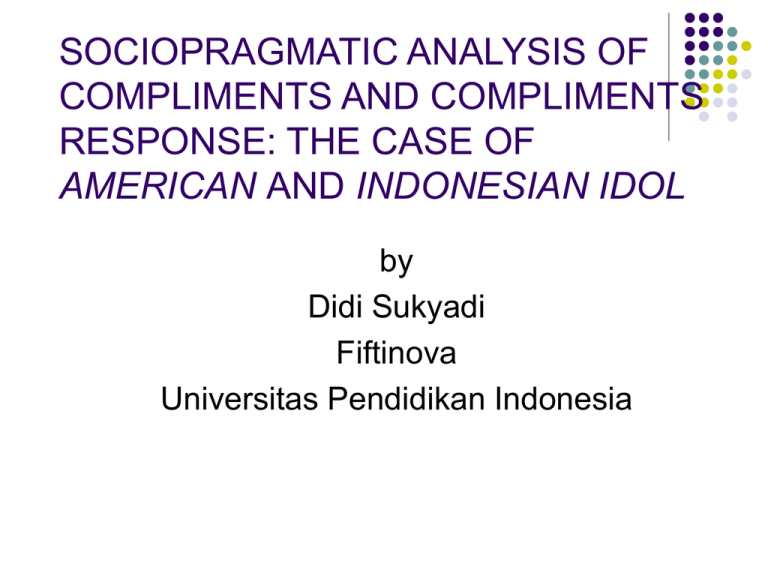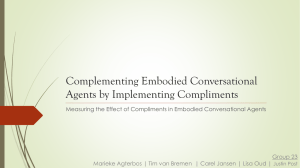
SOCIOPRAGMATIC ANALYSIS OF
COMPLIMENTS AND COMPLIMENTS
RESPONSE: THE CASE OF
AMERICAN AND INDONESIAN IDOL
by
Didi Sukyadi
Fiftinova
Universitas Pendidikan Indonesia
Background
Cultures and gender are suspected to
influence the nature of compliments
presented.
American and Indonesian Idols are
entertainment programs in which
compliments to distant relationship frequently
happen.
Different from traditional format, in
Indonesian and American Idol format,
judgment is explicitly given.
Compliments
are influenced by social status
from someone higher in position goes in the
form of encouragement
From someone lower in position tends to be
in the form of appearance
Gender differences
Women are frequent recipient possession of
compliments regardless of their status.
Holmes (1988) states that women give and
receive significantly more compliments to
each other than they do to men or men do to
each other
Compliments are used:
for establishing solidarity, replacing greetings
or apologies, opening and sustaining
conversation, or reinforcing desired behavior.
to soften face-threatening acts such as
apologies, requests and especially criticism
(Brown & Levinson 1978).
Responding to compliments
can be verbal and nonverbal behavior (facial
expression, gesture, or body language) such
as smiles (Holmes, 1987).
In Indonesian culture smile shows pleasure,
acceptance, friendliness and situationshooting. In American culture it shows
friendliness.
Verbal compliment responses may include
acceptance, rejection, mitigation, no
response, and request interpretation
Methodology
Population: American Idol season 7 and Indonesian
Idol season 5 both the commentators and the
contestants.
Participants: 3 commentators of each program
(American and Indonesian Idols) and the top 8
contestants (4 males and 4 females)
Length of observation: two weeks of performance.
Data: all utterances of the commentators and the
competitors.
Data: from the recorded video which was
downloaded from www.i-tune.com and from
watching and audio taping the show every Friday on
8 p.m. in RCTI.
Non-verbal behavior such as smile, body language
and gestures that support the compliments and
responses were observed and noted.
Findings
American tends to give more compliments
and more expressive than their Indonesian
counterparts.
Country
N
Ration
American
Indonesian
170
81
2
1
Expressiveness
American Commentators
Indonesian
Commentators
All right. You know this is great, man.
This is a good moment for you and
me, you know why? (Why) I think
this is the best I’ve heard you sing
including when your audition. I think
that is the best you sounded to us. I
think it was stellar, I think it was
unbelievable, I’m shock! I’m loving it.
Yes…yes…you got another
competitor in the competition.
Suaranya
industri banget.
Suaranya kalo
direkam asyik.
Types of Compliments
Most of commentators gave compliments to the
contestant’s ability such as “Great performance”,
“You’re fantastic” or “That was the best performance
I’ve ever heard”.
The emergence of two other topic compliments
(appearance and personality) was not so often used
by the speakers because Idols program is merely a
singing competition.
This reality is different from daily life context in which
the topic of appearance will come first.
No difference in compliment
topic
Types of
Compliments
Appearance
Skills
Personality
TOTAL
American
Indonesian
7
(4.1%)
161
(94.7%)
2
(1.2%)
170
6
(7.4%)
72
(88.9%)
3
(3.7%)
81
Topics of Compliments
American
Indonesian
The way of choosing song
Quality of performance
Singing technique
Voice quality
Star potential
Emotion
Performance quality
Stage act
Progress
Reflection
Star potentials
Appearance
Female American commentators offer more
compliments on appearance
Male American commentators seldom give
comments of one’s appearance but on
contestant’s ability.
Female American commentator compliments
not only woman’s appearance (“You look
beautiful”) but also man’s appearance (“I like
your hair cut”).
Compliment
response:Indonesian
Indonesian people have a tendency to accept
compliments.
“Thank You” (Appreciation Token)
“Okay, okay” (Comment Acceptance);
“Saya akan berusaha keras lagi (Comment
Acceptance);
“Ini yang saya nanti-nanti” (Comment Acceptance).
”Gara-gara Mas Andy Riyanto, keren banget
aransemennya” (Comment History).
smile and gestures when responding to
compliments.
Compliment responses:
Indonesian (Mostly acceptance)
(Appreciation Token) to each compliment they got.
Also, saying thanks like this is a part of Indonesian
culture in which politeness becomes the priority in
establishing relationship. However, this acceptance
can be in the form of other utterances like “Okay,
okay” (Comment Acceptance); “Saya akan berusaha
keras lagi (Comment Acceptance); “Ini yang saya
nanti-nanti” (Comment Acceptance). The
contestants would also mitigate the compliments by
stating, ”Gara-gara Mas Andy Riyanto, keren banget
aransemennya” (Comment History). In addition, they
also show smile and gestures when responding to
compliments.
Compliment responses:
American
They did not choose acceptance only (“Thank
You”).
reject (“I thought no, that’s not good”),
give return (“Your hair looks great Paula”)
give no response.
Similar to Indonesian, more expressive
nonverbal gestures found in American Idol
are smiling, jumping, punching hands, or
other kinds of body language.
Gender Differences
The commentators do not show any gender
differences on the types of topic chosen when
complimenting.
They offer compliments to woman in the same way
they do to man (the capability of each contestants).
women are the ones who usually give compliment to
one’s appearance. Male commentators seldom do
this both American and Indonesian Idols.
Both female and male American Idol contestants
give the same number of compliment responses to
female or male commentators.
Indonesian Idol contestants do not consider any sex
differences of commentators when responding to
compliments.







